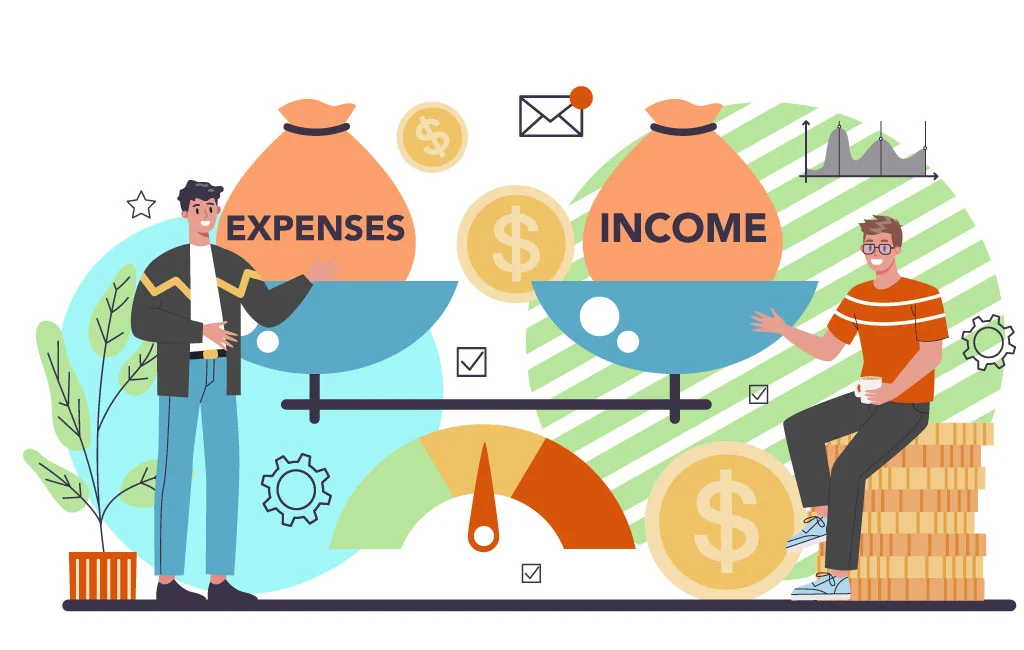Managing your finances can feel overwhelming. But it doesn’t have to be.
Understanding the basics of financial planning can change your life. Whether you want to save for a big purchase, reduce debt, or invest for the future, having a solid financial guide is crucial. This guide will help you make sense of money management.
It aims to simplify complex financial concepts. So, you can take control of your financial future with confidence. Ready to improve your financial health? Let’s dive into the essentials of smart money management.

Credit: www.toptal.com
Introduction To Money Management
Money management is a crucial life skill. It can determine your financial well-being. Understanding how to manage money is essential for achieving financial stability. This guide will help you grasp the basics and set you on the right path.
Importance Of Financial Literacy
Financial literacy means understanding money. It involves knowing how to budget, save, and invest. With financial literacy, you can make informed decisions. You can avoid debt and build wealth over time. It empowers you to control your finances effectively.
Setting Financial Goals
Setting financial goals gives you a clear direction. It helps you focus your efforts and resources. Start by identifying your short-term and long-term goals. Short-term goals may include saving for a vacation or paying off a small debt. Long-term goals could be buying a house or saving for retirement.
Write down your goals. Be specific and realistic. Break them down into smaller, achievable steps. Track your progress regularly. Celebrate small milestones to stay motivated. Setting and achieving financial goals can lead to financial success.

Credit: educounting.com
Budgeting Basics
Managing your finances can seem daunting. Budgeting basics are essential for financial stability. A solid budget helps you manage your income and expenses. It also ensures you live within your means. Let’s explore some key steps in budgeting.
Creating A Budget
Start by listing your sources of income. This includes your salary, freelance work, and any other earnings. Next, list all your monthly expenses. Include rent, utilities, groceries, and transportation. Don’t forget entertainment and savings. Ensure your expenses don’t exceed your income. If they do, find areas to cut back. This balance is crucial for financial health.
Tracking Expenses
Tracking your expenses is vital. It helps you see where your money goes. Use a notebook, spreadsheet, or budgeting app. Record every purchase, no matter how small. Review your spending weekly or monthly. This habit helps you spot patterns. It also shows areas to reduce spending. Consistent tracking keeps you on top of your finances.
Saving Strategies
Saving money is a crucial part of financial planning. Having a solid saving strategy can provide security and peace of mind. It allows you to handle unexpected expenses and plan for future goals. Below are some effective saving strategies to help you manage your finances better.
Building An Emergency Fund
An emergency fund is essential for financial security. It acts as a safety net during unforeseen circumstances. Aim to save three to six months of living expenses. Start small if necessary. Even saving a little each month can add up over time.
Keep your emergency fund separate from your regular savings. This will help you avoid spending it on non-emergencies. Consider setting up automatic transfers to your emergency fund. This makes saving easier and more consistent.
High-yield Savings Accounts
A high-yield savings account offers better interest rates than regular accounts. This means your money grows faster. Look for accounts with no monthly fees and easy access to your funds. Compare different banks to find the best rates.
High-yield savings accounts are a safe place to store your money. They are usually insured by the government. This means your money is protected up to a certain amount. By choosing a high-yield account, you maximize your savings without extra effort.
Debt Management
Debt management is a financial guide that helps individuals understand how to manage and reduce their debts. It offers practical advice on budgeting, negotiating with creditors, and planning for a debt-free future.
Debt Management is a crucial aspect of personal finance that can significantly impact your financial health. It involves understanding and controlling your debt, ensuring you can meet your obligations without compromising your future goals. Effective debt management empowers you to live without the constant worry of debt hanging over your head.
Understanding Good Vs. Bad Debt
Not all debt is created equal. Good debt can help you build wealth or improve your life in some way. Think of student loans or a mortgage. These types of debt often come with lower interest rates and can lead to future financial gains. Bad debt, on the other hand, typically comes with high interest rates and does not offer a return on investment. Credit card debt is a prime example. It’s easy to accumulate but hard to pay off, especially if you’re only making minimum payments. Recognizing the difference between good and bad debt can help you make smarter financial decisions. Ask yourself: Is this debt going to help me grow financially, or will it drag me down?
Strategies To Pay Off Debt
Paying off debt requires a clear strategy. The snowball method is popular; you start by paying off your smallest debts first. This can boost your motivation as you see debts disappearing quickly. Another strategy is the avalanche method. Focus on paying off debts with the highest interest rates first. This can save you money in the long run. Consider consolidating your debts if you have multiple high-interest debts. This can simplify your payments and potentially lower your interest rates. Create a budget that prioritizes debt repayment. Cut unnecessary expenses and redirect that money toward paying off your debt faster. Have you ever thought about selling unused items around your home? It’s a great way to generate extra cash to put towards your debt. Remember, the key is consistency. Stick to your plan and celebrate small victories along the way. How will you feel when you finally pay off that nagging credit card bill?
Investing Essentials
Investing can seem daunting, but understanding the essentials makes it easier. Knowing the basics helps in making informed decisions about where to put your money. Let’s dive into the key aspects of investing.
Types Of Investments
There are various investment options available. Stocks represent ownership in a company. They can provide high returns but come with higher risks. Bonds are loans to companies or governments. They offer lower returns but are generally safer. Mutual funds pool money from many investors to buy a diversified portfolio of stocks and bonds. They reduce risk through diversification. Real estate involves buying property to rent or sell. It can provide steady income and value appreciation. Finally, commodities like gold and oil can act as a hedge against inflation.
Risk And Return
Risk and return are closely linked in investing. Higher potential returns often come with higher risks. For instance, stocks can yield high returns but can also lose value quickly. Bonds are safer but offer lower returns. Diversification helps manage risk. By spreading investments across different assets, one can minimize the impact of a loss in any single investment. Understanding your risk tolerance is crucial. This depends on your financial goals, time horizon, and comfort with potential losses. Balancing risk and return is key to a successful investment strategy.
Retirement Planning
Creating a financial guide for retirement planning helps secure your future. Understand savings, investments, and budget management to enjoy a worry-free retirement.
Retirement Planning is a crucial aspect of your financial journey. It may seem distant now, but the earlier you start, the more comfortable your future will be. Planning for retirement is not just about saving money but also about ensuring you have the financial freedom to enjoy your golden years.
Importance Of Early Planning
Starting your retirement planning early can make a significant difference. Time is your biggest ally. The sooner you start, the more you benefit from compound interest. Consider this: saving $200 a month at an 8% annual return starting at age 25 could grow to over $700,000 by age 65. If you start at 35, that amount drops to about $350,000. Early planning also allows for adjustments. Life happens, and having a longer timeline gives you flexibility to adapt. Ask yourself: How would you like to spend your retirement? Your goals will shape your savings strategy. Starting early allows you to align your financial plan with these personal aspirations.
Retirement Accounts
Understanding different retirement accounts is key. Each has unique benefits and tax implications. 1. 401(k) Plans: Offered by many employers, they often include matching contributions. Maximize your employer match—it’s essentially free money. Contributions are pre-tax, reducing your taxable income now but taxed upon withdrawal. 2. Individual Retirement Accounts (IRAs): These come in two types—Traditional and Roth. Traditional IRAs offer tax-deductible contributions, while Roth IRAs provide tax-free withdrawals. Think about your current tax rate and future expectations to choose wisely. 3. SEP IRAs and SIMPLE IRAs: Ideal for self-employed individuals and small business owners. They offer higher contribution limits compared to traditional IRAs. Regularly review your retirement accounts. Adjust contributions based on your financial situation and retirement goals. Are you taking full advantage of your retirement account options? It’s worth sitting down with a financial advisor to explore the best strategy for you. Early planning and understanding your retirement accounts can set you on the path to a secure and enjoyable retirement. Start today and give your future self the gift of financial freedom.
Tax Planning
Tax planning is a crucial part of managing your finances. It helps you understand how taxes impact your income. By planning ahead, you can save money and reduce stress. Let’s dive into two key areas: understanding tax brackets and tax-advantaged accounts.
Understanding Tax Brackets
Tax brackets determine the rate you pay on different portions of your income. The government sets these rates. They range from lower to higher percentages as your income increases. Knowing your tax bracket helps you plan better. You can estimate your tax bill and avoid surprises. It’s essential to keep track of any changes in the tax laws. Staying updated can save you money in the long run.
Tax-advantaged Accounts
Tax-advantaged accounts offer benefits for saving and investing. These accounts include 401(k)s, IRAs, and HSAs. Contributions to these accounts can reduce your taxable income. This means you pay less in taxes now. Some accounts also provide tax-free growth. This means you won’t pay taxes on the earnings while the money is in the account. It’s a smart way to save for retirement or healthcare costs.
Using tax-advantaged accounts wisely can make a big difference. They help you build wealth and reduce your tax burden. Make sure to contribute regularly and understand the rules. This will ensure you get the most out of these accounts.
Financial Tools And Resources
When managing your finances, having the right tools and resources can make a world of difference. Financial tools help you track your expenses, save money, and even grow your wealth. Let’s explore some of the most useful financial tools and resources available today.
Budgeting Apps
Budgeting apps are a game-changer for keeping your finances in check. These apps help you monitor your spending, categorize expenses, and set financial goals. You can see where your money goes and make adjustments easily.
I once struggled with overspending, especially on eating out. Using a budgeting app, I tracked my expenses and realized how much I was spending on restaurants. This insight helped me cut back and save more.
Popular budgeting apps like Mint and YNAB (You Need A Budget) offer great features. They provide alerts for due bills, suggest budget adjustments, and even offer advice on saving more. Imagine knowing exactly when your bills are due and how much you can safely spend on non-essentials.
Investment Platforms
If you want to grow your wealth, investment platforms are essential. These platforms make it easy to start investing, even if you’re a beginner. They offer various investment options, from stocks to mutual funds, and provide tools to help you make informed decisions.
When I first started investing, I felt overwhelmed by the options. Using an investment platform like Robinhood simplified the process. The app’s user-friendly interface and educational resources helped me understand my choices better.
Other platforms like Acorns and Betterment offer automated investment options. They round up your purchases to the nearest dollar and invest the spare change. This method is great for those who want to invest without thinking too much about it.
Have you thought about how investing could impact your financial future? Start exploring these tools and see how they can help you achieve your financial goals. Remember, the first step to financial freedom is taking control of your finances today.
Protecting Your Finances
Protecting your finances is crucial. You work hard for your money. Guard it well. This section explores vital ways to keep your funds safe. Learn key steps to secure your financial future.
Insurance Options
Insurance is essential. It protects against unforeseen events. Health insurance covers medical expenses. Life insurance ensures your family is safe. Auto insurance protects your car. Home insurance safeguards your property. Choose policies wisely. They offer peace of mind. Compare different providers. Look for the best rates. Ensure you understand the coverage. Read the fine print. Know what is included. Knowing your options helps make informed decisions.
Identity Theft Protection
Identity theft is a growing threat. Protect your personal information. Use strong passwords. Change them regularly. Avoid sharing sensitive details online. Monitor your bank statements. Look for unusual activity. Consider identity theft protection services. They offer alerts and support. Shred documents with personal information. Be cautious with public Wi-Fi. Secure your devices. Install antivirus software. Stay vigilant. Being proactive helps prevent identity theft.

Credit: www.amazon.com
Frequently Asked Questions
What Does A Financial Guide Do?
A financial guide offers advice on budgeting, investments, retirement planning, and financial goals. They help manage and grow your money.
What Is The 50/30/20 Rule In Your Financial Plan?
The 50/30/20 rule divides your income into three categories: 50% for needs, 30% for wants, and 20% for savings.
Can I Talk To A Financial Advisor For Free?
Yes, you can talk to a financial advisor for free. Many offer initial consultations at no charge.
What Is The 1234 Financial Rule?
The 1234 financial rule suggests allocating income as follows: 10% to savings, 20% to debt repayment, 30% for housing, and 40% for living expenses. This method helps manage finances effectively.
Conclusion
A solid financial plan helps you secure your future. Follow the steps in this guide. Stay disciplined with your budgeting. Track your expenses closely. Save and invest wisely. Make informed financial decisions. Remember, every small effort counts. Revisit and adjust your plan regularly.
Financial stability is achievable. Stay committed and patient. Your future self will thank you.


